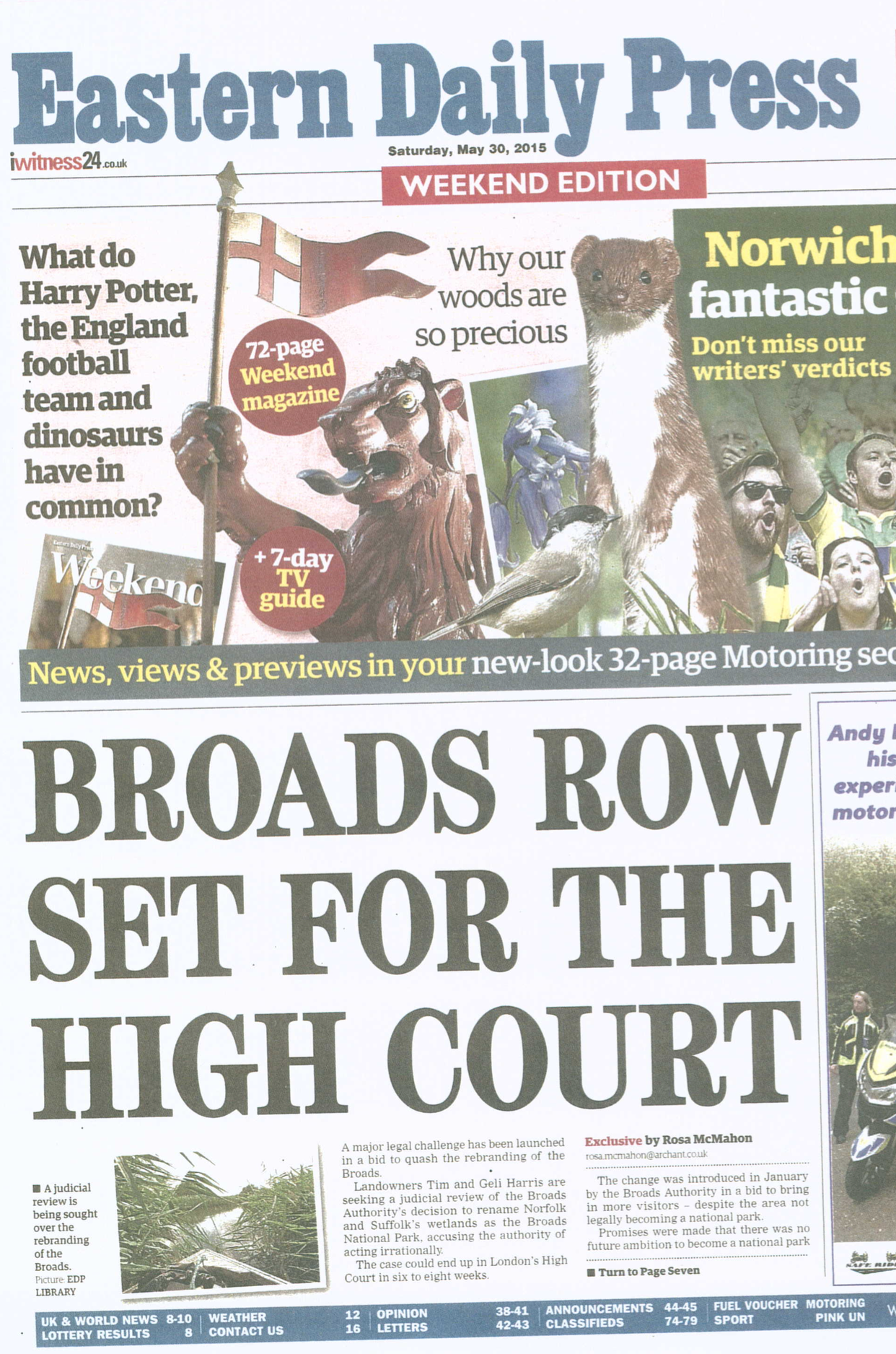
Broads row set for the High Court
A major legal challenge has been launched in a bid to quash the rebranding of the Broads.
Landowners Tim and Geli Harris are seeking a judicial review of the Broads Authority’s decision to rename Norfolk and Suffolk’s wetlands as the Broads National Park, accusing the authority of acting irrationally.
The case could end up in London’s high court in 6 to 8 weeks.
The change was introduced in January by the Broads Authority in a bid to bring in more visitors – despite the area not legally becoming a National Park.
Promises were made that there was no future ambition to become a National Park in law and the Sanford Principle – which puts conservation as a priority over recreation and navigation – Will not be applied for. The park is already part of the National Park family.
The government objected to the name change on legal grounds in 2008 and 2009, but has since said the decision rested with the authority and its stakeholders.
Mr Harris, 67, of Catfield Hall, in Catfield, described the Broads Authority’s decision as “wrong and misleading,” believing the consultation process was incomplete and the change neglected conservation.
In a statement, the Broads Authority said: “We have been advised by solicitors acting for a member of the public that they have issued a claim seeking to judicially review the Authority’s decision on 23rd of January 2015 concerning the branding of the Broads area as the Broads National Park.
And Jacquie Burgess, chairman of the Broads Authority, said: “The authority followed due process in coming to its decisions relating to the branding of the area for marketing purposes and we are confident in our defence of this position.”
In Mr and Mrs Harris’s legal papers, the Broads Authority are accused of acting “unlawfully”, and being “irrational” and “unreasonable”.
They read: “By misappropriating the name, identity and function of a national park, the purported rebranding has the potential to confuse the public as to the status of the authority.
“We are unaware of any other public authority lawfully rebranding itself in the style of another public body with different and legally distinct functions.
“Given the local, regional and national importance of this matter, and the authority’s clear disregard for the law, its duties and the environment as a whole, we are confident the court will grant such an order.”
Mr and Mrs Harris have been battling to save Catfield Fen from being damaged by abstraction for the past seven years.
Earlier this month the Environment Agency refused the renewal of two water abstraction licences affecting the site and neighbouring Sutton Fen.
Mr Harris said this experience has shown the Broads Authority’s decision-makers give “insufficient attention to support its conservation objectives”.
“Now in the rebranding exercise, they have weakened further the Broads Authority’s position on conservation by dropping its planned ambition of becoming a legal national park and by agreeing never to implement the Sanford principle, which, by giving first priority to conservation, is the distinguishing feature of a national park, ” he said.
Natural England have been invited to be a party in the case as they were not consulted by the Broads Authority over the name change.
One of Natural England’s statutory duties is to consider which areas in England meet the criteria for designation as a national park.
The Broads Authority say they did not need to consult the government quango as they had already done so with Defra.
Judicial review
A judicial review is a court proceeding where a judge reviews the lawfulness of a decision or action made by a public body.
It is a challenge to the way in which a decision has been made, rather than the rights and wrongs of the conclusion reached. It is not concerned with the conclusions of that process and whether those were “right”, as long as the right procedures have been followed. The court will not substitute what it thinks is the “correct” decision.
Tim Harris’s case could end up in London’s High Court in six to eight weeks.
Summary of the claims
• The Broads Authority has used a power that it does not have or is unable to use;
• The focus on promoting the Broads does not follow the core functions of the authority;
• Prioritising conservation is key to all National Parks — therefore not following the Sandford Principle or seeking legal status is irrational;
• The Broads Authority failed to consult properly or give proper reasons for its decision;
• Natural England was not consulted;
• The rebrand misrepresents the Broads Authority.
